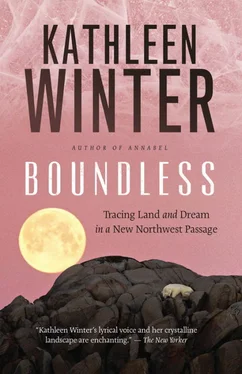“Would you be at all interested,” a writer colleague said, “in going on a vessel through the Northwest Passage?”
“The Northwest Passage ?”
“Yes,” said my friend Noah. “You might have heard that Russian icebreakers sometimes go up there and take passengers through. They like to have a writer on board, and I can’t go, so I suggested you, but I wanted to check with you first that it might be something you’d like to do.”
I thought of Franklin’s bones, of the sails of British explorers in the colonial age, of a vast tundra only Inuit and the likes of Franklin and Amundsen and a few scientists had ever had the privilege of navigating. I thought of lead poisoning in the tinned food of Franklin’s men, and of underwater graves and lost ships named Erebus , which meant “darkness,” and Terror , which meant… I thought of my own British childhood, steeped in stories of sea travel. I thought of Edward Lear’s Jumblies, who went to sea in a sieve. I thought of Queen Victoria and Jane Franklin, and of the longing and romance with which my father had decided to immigrate to Canada. I thought of all the books I’d read on polar exploration, on white men’s and white women’s attempts to travel the Canadian Far North.
I felt Noah was inviting me to go to the place where an imaginary world intersects with the real: a place where time flows differently from the linear way in which we have trained it to behave down here, in the southern world. The name “the Northwest Passage” is not written on world maps: it is an idea rather than a place. I’d long felt the power of that idea pull me in a way I couldn’t fully understand.
My daughters were no longer helplessly small, and I’d already set off on a few modest travels, leaving them temporarily motherless. To look on a map at the route Noah had invited me to take thrilled me with images of ice, sea, and loneliness. For a writer, loneliness is magnetic. The very names on the map excited me: Lancaster Sound, Resolute, Gulf of Boothia. I knew that to go to these places would activate something inside me that had long lain dreaming.
I thought of the soul’s journey to any kind of frontier, physical or spiritual. The Northwest Passage was the epitome, in my mind, of a place so exciting I’d never dared to imagine I might see it. How many times had I sat in my kitchen with my guitar, picking out the haunting melody of the old broadside ballad “Lady Franklin’s Lament”?
In Baffin’s Bay where the whale fish go
The fate of Franklin no man may know.
The fate of Franklin no man can tell.
Lord Franklin among his seamen do dwell…
“The ship,” said Noah, “leaves this coming Saturday. “You’ll be gone two weeks. I realize it’s short notice…”
It was impossible for me to resist the vortex of excitement I felt that morning. Had the perfect response to this very invitation not been drilled into me only days before by Denise, on Aloise’s dock? And when a man called Noah suggests you get on a ship, hadn’t you better jump on board?
“My bags,” I told him, “are already packed.”
I TRIED TO remember what I’d put in the getaway bag Denise had prescribed: a little black dress, two pairs of underwear, a T-shirt, and a pair of jeans. I remembered reading that Franklin and his men had ventured to their deaths in masculine nineteenth-century versions of much this same idea: knickerbockers, silk shirts, stockings. I pictured the mummified remains of Franklin’s men, which I’d seen in history books, with their preserved grimaces, their emaciated agony. I decided to call my friend Ross to ask him what he thought. I’ve known Ross since high school in Corner Brook, where at seventeen we sat on dumpsters behind the main drag, looking up at the rock face looming behind Woolworths and pretending we were in Naples. We had both ended up in Montreal, which was, we decided, a pretty good substitute.
“The Northwest Passage?” said Ross.
“Yes. I’m a bit worried. Of course I’m excited, but…”
“I can understand that. I can understand you feeling a bit worried.”
“I mean Franklin’s half-eaten body is still up there, under the ice.”
“Yes, but—”
“Cannibalized.”
“I know, but you’ll hardly—”
“And riddled with lead poisoning, and I know the ice is melting up there, but it’s still extremely off — outside of — I mean, much of it is still uncharted, for goodness’ sake.”
“Yes, but surely the ship’s crew will know what they’re doing. They wouldn’t go up there if—”
“Right. But I mean you hear all the time, on the news…”
“I think you’re understandably a little afraid. But I don’t think it’s as…”
“You think I’ll be all right? I mean Esther’s twenty-one, but Juliette is still only thirteen.”
“Yeah, it’s normal for you to worry about your daughters. But that kind of worry can feel larger than, realistically—”
“You think I should just go?”
“Well, I mean, it’s normal to wonder. But really, if you go, what’s the worst thing that can happen?”
This final question was one we would remember later. But at the time, it seemed like a reasonable enough thing for him to ask, and the fact that he asked it assuaged my fears in the way that talking to an old friend can do even when there are no real answers. So I disobeyed Denise by repacking my bag, this time with a list in hand from the expedition leaders, whose packing instructions indicated I might need a woollen vest, and rubber boots, and hi-tech long johns unavailable to Franklin and his crew, whose delicates all had to be hand-stitched: the men vanished mere months before the invention of the sewing machine. I signed the expedition form and the waivers; I belonged to more modern times, a fact from which I derived a certain amount of courage. The forms and waivers came with photos of the other resource staff. I noticed they were nearly all men, and most had explorer-type beards. I happened to have a beard I’d crocheted out of brown wool on a train trip with my mother — t was a bit more Rasputin than Explorer, but it possessed loops that fit nicely around my ears, so I packed that as well.
The voyage list made no mention of musical instruments, but I’d read somewhere that Franklin’s ship had carried some sort of piano and that the men had, before their deaths, tried to cheer each other in the typical English way by putting on pantomimes and singing and dancing for each other through the Arctic nights. I had been fooling around on an old German concertina for some time, and could play “Lady Franklin’s Lament,” a few Newfoundland songs, and “The Varsovienne,” an old Warsaw folk dance that Gearóid Ó hAllmhuráin had taught me in St. John’s. The concertina possessed no case, but I took it to Canadian Tire and fitted it in an insulated beer cooler that had a shoulder strap and claimed to be waterproof. If I grew lonesome in the Northwest Passage, or became stranded on an iceberg with all hope of rescue lost, I would have my concertina, which I remembered my father once said was also called a ship’s piano.
“You should take my old Helly Hansen raincoat,” my husband said as he saw me rolling up my flimsy rain gear and stuffing it in the bag. His coat was heavy-duty and looked like the tarp I used to fling over the woodpile.
“That’ll never fit in the bag.”
“Wear it.”
“It has a hole under the arm.”
“That is a perfect coat.”
“And the pocket’s ripped.”
“Hang on.” He went to the basement and came back with a brand new roll of duct tape, tore off a few strips, and plastered them artistically over the holes. “There you go. Now you’re ready for the elements.”
Читать дальше












